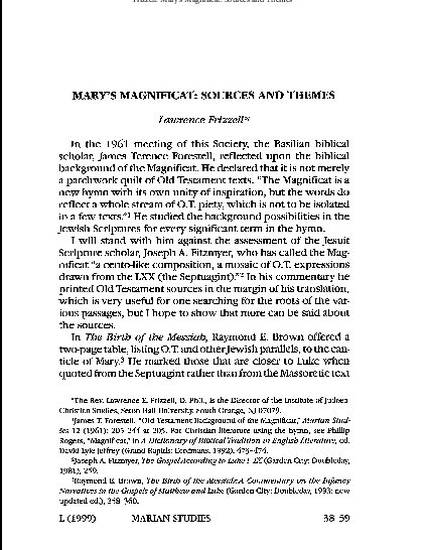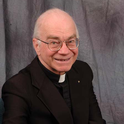
Article
Mary's Magnificat: Sources and Themes
Marian Studies
(1999)
Abstract
In the 1961 meeting of this Society, the Basilian biblical scholar, James Terence Forestell, reflected upon the biblical background of the Magnificat. He declared that it is not merely a patchwork quilt of Old Testament texts. "The Magnificat is a new hymn with its own unity of inspiration, but the words do reflect a whole stream of O.T. piety, which is not to be isolated in a few texts." He studied the background possibilities in the Jewish Scriptures for every significant term in the hymn.
I will stand with him against the assessment of the Jesuit Scripture scholar, Joseph A. Fitzmyer, who has called the Magnificat "a cento-like composition, a mosaic of O.T. expressions drawn from the LXX (the Septuagint)" . In his commentary he printed Old Testament sources in the margin of his translation, which is very useful for one searching for the roots of the various passages, but I hope to show that more can be said about the sources.
In The Birth of the Messiah, Raymond E. Brown offered a two-page table, listing O.T. and other Jewish parallels to the canticle of Mary. He marked those that are closer to Luke when quoted from the Septuagint rather than from the Massoretic text of the Hebrew Bible. This summarized the work of those reviewing the issues related to the original language of the prayer.
Is this Luke's composition or does it derive from early tradition? Some scholars argue for Lucan authorship but many see a Jewish-Christian source or sources for the canticles in Luke 1-2 and a few consider the Magnificat to be a Jewish hymn transplanted into the New Testament.
Keywords
- Magnificat,
- Amidah,
- James Terence Forestell,
- Joseph A. Fitzmyer,
- Raymond E. Brown,
- Birth of the Messiah,
- Luke 1,
- Lk 1,
- Luke 2,
- Lk 2,
- Lucan infancy narrative,
- Poor of the Lord,
- anawim,
- Mary,
- prayers of women,
- Deborah,
- Hannah,
- Miriam,
- Mother of the seven martyrs,
- Esther,
- Judith,
- Susannah,
- Aseneth,
- Jewish-Christian,
- Institute of Judaeo-Christian Studies,
- Benedictus,
- Nunc Dimittis,
- Holy Spirit,
- Eighteen Benedictions,
- Tefillah,
- prayer of intercession,
- Zechariah,
- ascending blessing,
- Annunciation,
- Visitation,
- Prayers of petition,
- First Temple period,
- thanksgiving,
- Wisdom of Jesus ben Sira,
- Ecclesiasticus,
- Hallel,
- Psalm 136,
- Ps 136,
- Passover Seder,
- Siddur,
- Lucan canticles,
- Kyrios,
- 1 Sam 2,
- 1 Samuel 2,
- Habakkuk 3,
- Hab 3,
- Adonai,
- Ex 34,
- Exodus 24,
- gibbor,
- loving-kindness,
- gebhuroth,
- Cairo Geniza,
- qeddushot,
- Acts 1,
- Joseph Mary Plunkett,
- Joseph Plunkett,
- Paschal Mystery,
- Jesus,
- Messiah,
- Gerard Manley Hopkins,
- Mother of God,
- Hymn of the Three Youths,
- Lucan prayers,
- glory,
- kabhod,
- blessing,
- berakhah,
- hesed,
- faith,
- emunah,
- shalom,
- abhodah,
- John 17,
- Jn 17
Disciplines
Publication Date
1999
Citation Information
Lawrence E. Frizzell. "The Magnificat: Sources and Themes" Marian Studies 50 (1999): 38-59.
Available at: http://works.bepress.com/fatherlawrence_frizzelldphil/99.
Creative Commons license

This work is licensed under a Creative Commons CC_BY-NC-ND International License.
